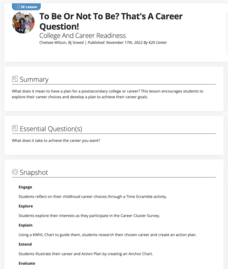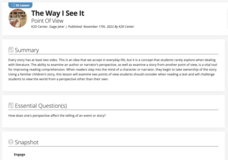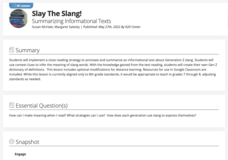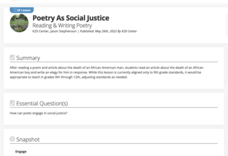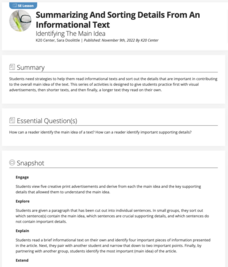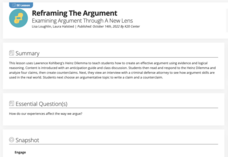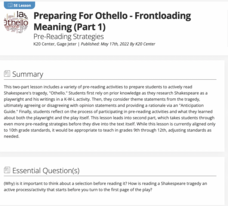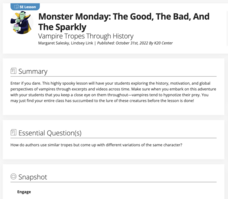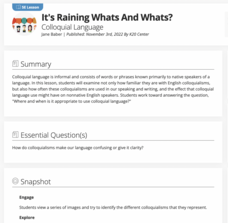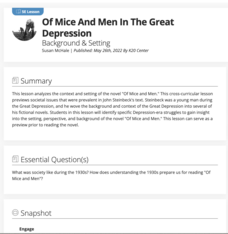K20 LEARN
Rikki-Tikki-Types of Sentences: Indicative, Imperative, Interrogative Mood
Rudyard Kipling's "Rikki-Tikki-Tavi" and a song from the musical "Hamilton" allow middle schoolers to practice using punctuation to indicate whether sentences are indicative, imperative, or interrogative.
K20 LEARN
The War of the Words: Grammar and Parts of Speech
Here's a lesson that adds some zip to a study of parts of speech. Class members read two versions of the same article, one loaded with evocative nouns, verbs, adjectives, and adverbs, while the other is missing this sensory language....
K20 LEARN
To Be or Not to Be? That’s a Career Question! College and Career Readiness
Tell your class members Que sera might be if they complete a survey of their interests, examine a list of careers that address these interests, research these careers, and develop an action plan that will help them progress toward their...
K20 LEARN
The Way I See It: Point of View
Robbers see a house from a different perspective than real estate agents. That's the big idea in a instructional activity about point of view. Groups assume the role of either robbers or real estate agents, note important details in a...
K20 LEARN
Totally Different Stories: Perspective
Two stories by Kate Chopin provide high school freshmen with an opportunity to reflect on the importance of the perspective from which a story is told. Class members read "The Story of an Hour" and a passage from The Awakening, then...
K20 LEARN
Slay the Slang! Summarizing Informational Texts
Middle schoolers get hip to the jive with a lesson plan about slang. They closely examine examples of slang and use context clues to infer the meaning of the terms. Groups read and summarize an article about a teacher who created a Gen Z...
K20 LEARN
Use Your Noodle: Avoiding Comma Blunders
Young grammarians will go to town with a lesson that doodles with macaroni! Scholars cook up sentences with the addition of commas, which makes all the difference in their meaning.
K20 LEARN
Speak Your Truth: Techniques in Spoken Word Poetry
As part of a study of Spoken Word Poetry, class members watch a series of performance videos and note where poets get their ideas and the performance techniques used by the poets. Pupils then draft and share their poems.
K20 LEARN
Poetry as Social Justice: Reading and Writing Poetry
Words can be a powerful tool in the hands of a poet. Class members examine a poem written by Ross Gay in response to the death of Eric Garner and a news report of the same death. They then read an article about the death of Tamir Rice...
K20 LEARN
Street Cred: Evaluating Sources
A instructional activity on evaluating sources of information teaches scholars to "think twice" before using a source. Researchers examine a resource's home page, author, and sponsor, as well as the date published and the documentation...
K20 LEARN
Speak Up! Four Categories Of Speeches
High schoolers examine the four major types of speeches: informative, demonstrative, persuasive, and extemporaneous. Groups then select one type and craft and share a presentation highlighting this format's characteristics. Finally,...
K20 LEARN
Summarizing and Sorting Details from an Informational Text: Identifying the Main Idea
Scholars participate in two activities that teach them to identify the main idea and key supporting details in informational text. Partners create a visual that reflects the main idea and key supporting details in an informational text...
K20 LEARN
Presenting with Confidence: Speech and Debate
Stage fright? Class members learn strategies to overcome stage fright and develop confidence when giving speeches and engaging in debates.
K20 LEARN
Reframing the Argument: Examining Argument through a New Lens
As part of a study of crafting compelling arguments, class members tackle the problem presented in Lawrence Kohlberg's "The Heinz Dilemma." After discussing the dilemma with classmates, writers draft an essay with a claim, support it...
K20 LEARN
Preparing for Othello - Frontloading Meaning (Part 2): Pre-reading Strategies
The second lesson in a two-part series that prepares high schoolers for a study of Othello focuses on additional pre-reading strategies. Pupils reflect on what they have learned and consider what they would like to learn about the play....
K20 LEARN
Preparing for Othello - Frontloading Meaning (Part 1): Pre-reading Strategies
The success of any lesson plan based on a complex text relies heavily on what instructors do before beginning the reading. Before reading Othello, scholars engage in a series of pre-reading activities, including completing an...
K20 LEARN
Sentence Structure in Siddhartha: Simple, Compound, Complex, and Compound-Complex Sentences
While wisdom may not be communicated, knowledge of sentence structures certainly can. Teach young grammarians the power of syntax with a instructional activity that uses Herman Hesse's Siddhartha as a mentor text. Learners first rewrite...
K20 LEARN
Say It with Style: Syntax and Parallel Structure
Dr. Martin Luther King, Jr.'s "I Have a Dream" speech provides the text for a lesson that introduces scholars to the significance of syntax. After examining several types of clauses, phrases, and structures, class members use the...
K20 LEARN
Monster Monday - The Good, the Bad, and the Sparkly: Vampire Tropes through History
Fangs, capes, pale skin, and beady eyes! High schoolers investigate the tropes associated with vampires by examining excerpts from stories and films. They then create a timeline that reveals how the depictions of vampires have evolved...
K20 LEARN
It’s Raining Whats and Whats? Colloquial Language
"Yuns betta outten the lights!" Colloquial language is the focus of a lesson that asks middle schoolers to consider the pros and cons of using idioms. They read articles, match expressions with their meaning and place of origin, and...
K20 LEARN
It’s All Greek to Me: Greek and Latin Roots
Ancient Greeks and Romans have contributed far more to modern culture than mythic heroes and stunning architecture. Greek and Latin roots are the foundation of many English words. Middle schoolers engage in an activity that asks them to...
K20 LEARN
Mob Mentality and "The Outsiders": Integrating Fiction and Nonfiction
S. E. Hinton's The Outsiders allows middle schoolers to reflect on mob mentality. After reading an article and watching a video about herd mentality, class members find examples in the novel of when characters go along with the crowd and...
K20 LEARN
Of Mice and Men in the Great Depression: Background and Setting
What were living conditions like in the United States during The Great Depression, and how do those conditions compare with today? That's the question young scholars consider as they prepare to read John Steinbeck's Of Mice and Men....
K20 LEARN
Multimodal Narrative Writing: Thumbprint Autobiography
Thumbprints, like people, are unique. Middle schoolers watch videos that explain how fingerprints are created and why they are unique. Learners then respond to guiding questions about themselves and use these details to create their...




